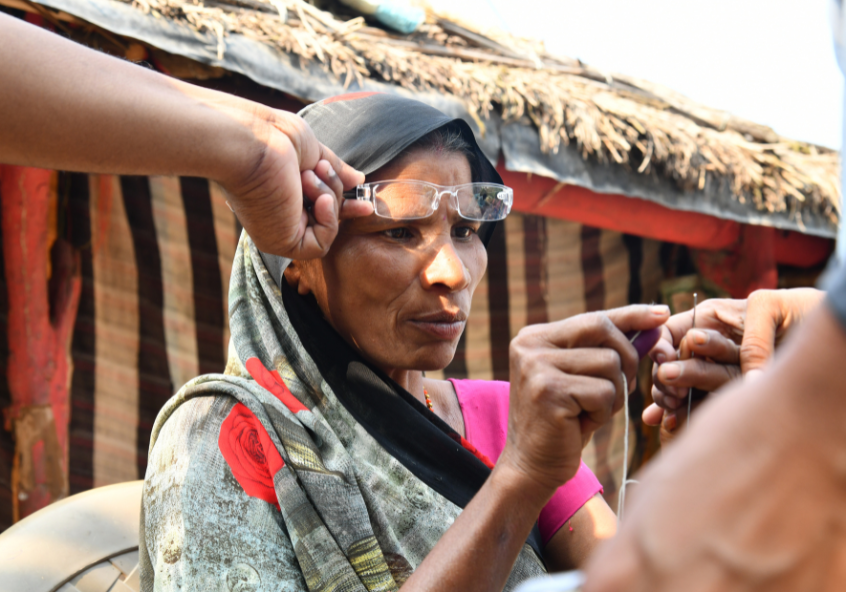How affordable reading glasses could save the global economy billions
London School of Hygiene & Tropical Medicine https://lshtm.ac.uk/themes/custom/lshtm/images/lshtm-logo-black.png Monday 17 February 2025
Sarojni Devi threading a needle after receiving near vision glasses. Credit: Dr Shroff's Charity Eye Hospital
Reading glasses are an essential and normal part of life for many adults. Yet globally it is estimated that up to 800 million people need spectacles for close work, but do not have them.
Typically beginning around age 35, near vision impairment, or presbyopia, results from the eye’s lens losing flexibility, which makes it more difficult to focus on objects close up. Left uncorrected, presbyopia can hinder daily tasks such as reading, using digital devices, and performing work that requires precision.
The impact is substantial, affecting a person’s ability to function and their quality of life. The overall economic productivity losses due to unaddressed vision impairment are around $411bn each year worldwide, of which presbyopia is a major component. Ensuring that people who need them can get reading glasses, or ‘readers’, could bring huge potential gains to society, economies and lives.
Presbyopia has a very simple and highly effective solution that has existed for over 700 years: glasses. But it only works if people can access them. Currently far too many people are less able to work, study, take care of their family or enjoy life to the full because of unaddressed presbyopia. Many cannot afford spectacles or are not aware they have a problem due to a lack of screening.
Gathering robust evidence on this issue is crucial to ensure that countries worldwide are able to effectively identify and provide people with good quality and affordable glasses. There is currently limited evidence demonstrating the economic benefit of readers for policymakers when considering whether to prioritise addressing this condition.
That’s why two new studies, which will investigate to what extent providing reading glasses can lead to improvements in economic wellbeing and quality of life, are so important. The five-year programme will involve two randomised controlled trials – one in India and one in Kenya – to measure the impact in adults 35-65, after being provided with glasses. A total of 20,000 people across the two countries will either be given glasses at the start of the study, or be in a control arm where they don’t have them. Those in the control group will receive glasses at the end if they need them.
We’ll collect data at baseline, one and two years to assess the impact of the glasses on those who were and were not given them, through household consumption (how much people have spent on goods like food), quality of life, and other factors like employment, productivity and income.
This research is being coordinated by the team at the International Centre for Eye Health at the London School of Hygiene & Tropical Medicine (LSHTM), in partnership with colleagues in India – Dr Shroff’s Charity Eye Hospital, Operation Eyesight Universal and Peek Vision – and Kenya – KEMRI, Kisii Eye Hospital, and Peek. This work is being supported by a $4.8m (£3.9m) grant from GiveWell, Founders Pledge and the Livelihood Impact Fund.
Through this work we aim to give governments and major donors a mandate to improve lives and livelihoods, at scale, through a simple and cost-effective solution, giving millions the opportunity to see, work and thrive.
If you enjoyed this article and would like to build a career in global health, we offer a range of MSc programmes covering health and data, infectious and tropical diseases, population health, and public health and policy.
Available on campus or online, including flexible study that works around your work and home life, be part of a global community at the UK's no.1 public health university.

